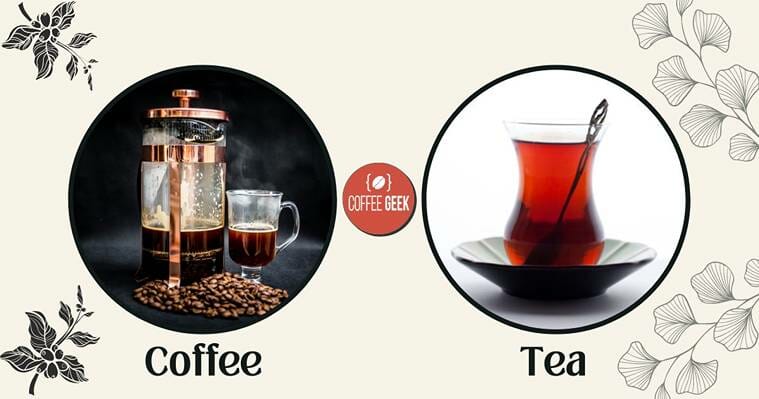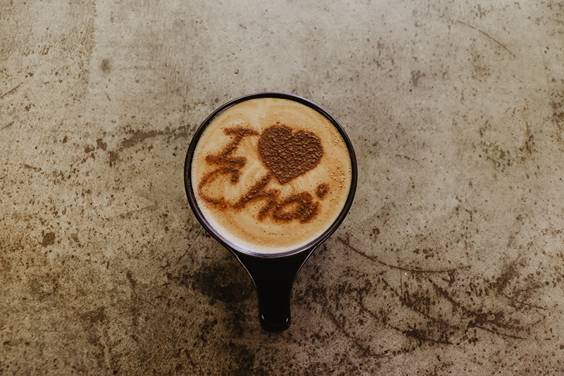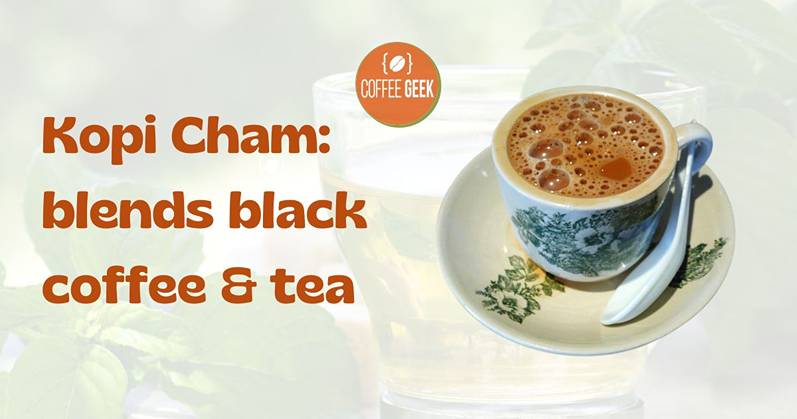When you’re a fan of both coffee and tea, there’s no need to choose only one.
Mixing coffee and tea has been a time-honored tradition in various parts of Asia and northern Africa, creating unique flavor combinations that are both exciting and delicious.
Whether you’ve never dared to mix the two or just want to expand your knowledge on this intriguing topic, this article will guide you through everything you need to know about the art of blending coffee and tea.
The basic concept of mixing coffee and tea involves finding the right balance that complements both the rich, bold flavors of coffee and the subtle, complex flavors of tea.
As you explore popular coffee tea combinations, you’ll learn about the different flavor profiles that result from experimenting with various types of tea and coffee.
It’s important to weigh the health benefits and risks associated with these blends, as well as learn tips and tricks to create your own unique coffee-tea concoction.
Key Takeaways
- Explore the art of blending coffee and tea for unique flavor experiences
- Discover popular coffee-tea combinations and their resulting flavor profiles
- Learn about the health benefits and risks of mixing tea and coffee, and create your own innovative blends
The Basics of Mixing Coffee and Tea
Coffee and Tea: Key Differences
Before diving into the world of mixing coffee & tea, it’s essential to understand their key differences.
Coffee is made from the roasted seeds of Coffea plants, while tea comes from the leaves of Camellia sinensis plants. The two beverages have distinct flavors and characteristics.
For instance, coffee often has a stronger, richer taste than tea, which can range from light and delicate to bold and robust.

Caffeine content is another significant difference between coffee and tea, with coffee generally containing more caffeine than tea.
The brewing methods for the two drinks also vary.
You typically brew coffee using hot water poured over ground coffee beans first, while tea is steeped in hot water, sometimes with added flavorings.
Why Mix Them Together?
Now that you’re familiar with the distinctions between coffee and tea, you may wonder why a coffee person would want to mix them.
The truth is, combining these two popular drinks opens up a world of exciting flavor possibilities for your taste buds.
Mixing coffee and tea offers a unique flavor profile, blending the bold and intense taste of coffee with the subtle, aromatic qualities of tea.
It’s a perfect match for those seeking something a little different from their usual beverage of choice.

Moreover, mixing the two can provide a more balanced caffeine experience.
If you’re sensitive to caffeine or looking for a milder boost, combining coffee with tea can give you the perfect balance between energy and relaxation.
In conclusion, mixing coffee and tea can be a delightful way to experiment with new flavors while reaping the benefits of both beverages.
It allows you to combine coffee and to create a custom drink tailored to your preferences and offers a fun, creative opportunity for any coffee or tea enthusiast.
Popular Coffee-Tea Combinations
Dirty Chai Latte

If you’re a fan of spiced lattes, you’ll love a Dirty Chai Latte. This beverage combines chai tea with a shot of espresso, creating a delightful blend of flavors.
Simply mix your favorite chai tea, typically containing black tea, cinnamon, cloves, ginger, and cardamom, with a shot of espresso and steamed milk to balance the taste.
It’s a perfect choice for those who enjoy the flavors of classic chai but need that extra espresso kick.
Kopi Cham

Kopi Cham is a popular drink in Malaysia, which blends black coffee and tea.
To make this delicious concoction, brew equal parts strong black coffee (like robusta) and bold-tasting black tea (like Ceylon tea).
Mix them together, and add in sugar and condensed milk to taste.
The resulting drink is a rich, creamy, and satisfying mix of both worlds, offering the robustness of coffee with the smoothness of tea.
Yuenyeung

Another well-known hot coffee tea mix is the Hong Kong-originated Yuenyeung.
This drink is typically made with three parts strong black tea, three parts coffee, and one part evaporated milk.
Yuenyeung can be found in almost every traditional tea house and eatery in Hong Kong.
The combination of flavors creates a unique and refreshing taste, perfect to be enjoyed either hot or cold.
Matcha Coffee

For a change of pace, try Matcha Coffee. This blend combines the earthy and sweet taste of high-quality matcha tea with coffee, often served as a latte.
There are numerous ways to make Matcha Coffee, such as adding a shot of espresso to a matcha latte or simply blending matcha tea powder with cold-brewed coffee.
The result is a visually appealing and energizing drink, providing the antioxidant benefits of tea and the bold flavor of coffee.
Flavor Profiles of Coffee and Tea Blends
When exploring the world of coffee and tea blends, you’ll come across a variety of flavor profiles.
Let’s dive into some of the most popular combinations and how they can excite your taste buds.
Earthy and Bold
If you’re a fan of robust and earthy flavors, try mixing black tea with coffee. A Ceylon black tea or Pu’erh tea could be an excellent choice to blend with your coffee.
The boldness of black tea combines with the familiar earthy bitterness of coffee to create a satisfying, full-bodied beverage that’ll keep you energized throughout the day.
Floral and Citrus
For those searching for a lighter, more refreshing taste, consider combining green tea or herbal teas with coffee.
Green tea complements coffee’s bitterness with its own subtle, floral notes.
Herbal teas, such as chamomile or lavender, can add a touch of soothing, aromatic citrus flavor to your coffee blend.
Just mix a freshly brewed cup of coffee with herbal or green tea for a delightful flavor twist.
Sweet and Spicy
Looking for a unique flavor experience? Coffee mixed with tea or herbal teas infused with spices can generate a delicious sweet and spicy blend.
You can enhance the natural sweetness with a touch of Redpath Simply Raw™ Turbinado Sugar or your preferred sweetener.
If you want even more excitement, experiment with adding cinnamon, cardamom, or cloves to your mix.
This sweet and spicy concoction will delight your senses and awaken your palate.
So go ahead, get creative, and find the perfect both tea and coffee blend that suits your taste preferences. Happy drink coffee sipping!
Health Benefits and Risks
Pros of Mix. Coffee and Tea
When you mix coffee and tea together, you can enjoy several health benefits. Firstly, this combination provides a balanced caffeine intake, which can boost your metabolism and help with weight loss weight-loss. The antioxidants found in both beverages play a role in reducing the risk of heart disease and type 2 diabetes reduced-risk.
Another advantage of combining coffee and tea is the presence of L-theanine, an amino acid found in tea that can promote relaxation and reduce anxiety l-theanine. This can help counteract the potential negative effects of caffeine, such as nervousness and jitters.
Cons of Mixing Coffee and Tea
While there are benefits to mixing tea and coffee, there are also some potential downsides. One of these is an increased caffeine intake which might not be suitable for everyone, particularly those sensitive to caffeine or with pre-existing heart conditions heart-conditions.
Another potential risk is the increased likelihood of experiencing heartburn. Coffee can sometimes cause this issue, and combining it with tea might exacerbate the problem for those who are susceptible to it heartburn.
Lastly, consuming large amounts of unfiltered, boiled coffee mixed with tea could lead to a mild increase in cholesterol levels cholesterol. Therefore, it’s essential to keep your consumption moderate and, if possible, opt for filtered coffee to minimize this risk.
Overall, a mix of coffee and tea can provide various health benefits, but it’s essential to ensure you don’t overdo it and be aware of potential risks if you have pre-existing health issues or a sensitivity to caffeine.
Remember, moderation is key.
Creating Your Own Coffee-Tea Blend
Selecting Components
To create your own specialty coffee and tea mix, you’ll want to start by selecting the right components for mixing.
Experiment with different types of tea and coffee to find a combination that suits your taste.
For example, a dark roast coffee is known for having a bold and robust flavor that can complement a strong, spicy masala tea.
On the other hand, a lighter roast coffee or a decaf coffee might pair well with a decaf tea, such as a floral or fruity blend, to create a lighter, refreshing drink.
Remember, it’s essential to prioritize your personal preferences, so choose a tea and coffee combination that appeals to your unique flavor profile.
Experimenting with Ratios
Finding the perfect ratio of coffee to coffee and tea mixtures is also important when creating a delicious hybrid beverage.
Start by mixing equal parts of coffee and tea, then adjust the ratios according to your taste preferences.
You could use a measuring spoon to keep track of the amounts you’re adding to the blend. Keep a notepad nearby to write down ratios, so you can easily replicate your favorite mixes.
Consider trying more tea than coffee for a less intense flavor or vice versa for a stronger, coffee-dominated taste.
Adjusting Consistency and Taste
Once you have the right combination of coffee and tea, you can tweak the consistency and taste of your blend to make it even more enjoyable.
Adding milk, evaporated milk, or condensed milk can enhance both the flavor and the creaminess of your coffee tea mix.
If you prefer a sweeter drink, feel free to mix in sugar or a sugar substitute to suit your preferences.
For those who enjoy a spritz of extra flavor, try adding a dash of cinnamon or nutmeg to your blend.
Remember, balancing flavors is key, so always taste your blend as you go and adjust in moderation until it’s just right for your palate.
As you experiment with your coffee-tea blends, remember that the process takes time and patience.
Continue tweaking your recipes, and you’ll soon have a delicious blend of instant coffee to call your own!
Innovative Coffee-Tea Concoctions
Matcha Tea Espresso Shot
Looking for a unique flavor and a quick caffeine drink coffee boost? Try the Matcha Tea Espresso Shot.
This concoction combines the earthy taste of matcha tea with the bold kick of espresso.
To create this delicious drink, simply whisk your matcha tea powder with hot water until it forms a thick, frothy texture. Then, add a shot of espresso to the mix.
The result is a vibrant green drink with a robust flavor that’s sure to surprise your taste buds.
Spritzed Coffee with Herbal Tea
If you’re in the mood for something light and refreshing, consider spritzing your coffee with herbal tea.
You can choose from a variety of herbal teas such as chamomile, peppermint, or hibiscus, to create an interesting flavor combo.
Just brew your favorite coffee and herbal tea separately, and then mix equal parts of both in a glass for a delightful and aromatic blend.
To elevate it further, add a splash of sparkling water or soda water, and enjoy your spritzed coffee-hybrid beverage.
Spreeze: A Concentrated Coffee-Tea Fusion
Spreeze is an intense fusion of strong black tea with concentrated coffee, offering a unique and powerful flavor experience.
This innovative drink originates from Hong Kong, under the name Yuenyeung, which you can prepare by brewing a bold black tea such as Ceylon or Pu’erh and then adding sugar and evaporated milk.
Finally, mix coffee in your hot, strong coffee to complete the Spreeze.
Serve it either hot or cold, and savor the rich, energizing combination of coffee and tea in a single, unified blend.
Frequently Asked Questions
Is it harmful to drink coffee and tea at the same time?
No, it’s not harmful to drink coffee and tea at the same time. In fact, many people enjoy combining the two beverages for a unique flavor experience. As long as you are mindful of your overall caffeine intake, mixed coffee & tea can be a pleasant way to enjoy both drinks.
What’s the best tea to blend with coffee?
The best tea to blend with coffee is milk tea, as it helps to cut through the bitterness of the coffee and creates a smoother flavor. Mixing black tea with black coffee might result in a bitter and unpleasant taste, so it’s better to have tea person avoid that combination. You can always experiment with different teas, but starting with a milk tea is a good choice.
Can mixing coffee and green tea help with weight loss?
While both coffee and green tea contain compounds that may support weight loss, there isn’t enough evidence to support the claim that mixing green tea and coffee provides additional benefits. It’s essential to remember that a balanced diet, regular exercise, and portion control are the main factors for maintaining a healthy weight.
What’s a common name for a coffee and tea mixture?
One common name for a coffee and tea mixture is “yuenyeung” or “yuanyang.” This beverage originates in Hong Kong and is a popular combination of coffee, black tea, and milk, offering a balanced flavor between the two drinks.
Should I wait to drink tea after having coffee?
There’s no strict rule about waiting to drink tea after having coffee. Ultimately, it depends on your personal preferences and caffeine sensitivity. You can consume tea bags after drinking coffee or vice versa, or even mix the two beverages together. Just be mindful of your total caffeine consumption throughout the day, and avoid too much coffee.
Why shouldn’t we drink tea or coffee on an empty stomach?
Drinking tea or coffee on an empty stomach can cause irritation to your stomach lining and may lead to acidity, heartburn, or an upset stomach. It’s advised to have a light snack or meal before consuming these caffeinated beverages to help minimize any potential discomfort.

